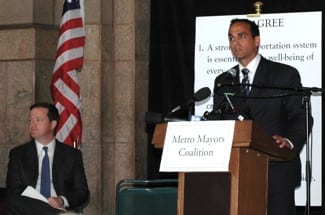Who is a member?
Our members are the local governments of Massachusetts and their elected and appointed leadership.
 A broad coalition of state and local leaders and advocacy groups rallied at South Station in Boston yesterday to call for a comprehensive plan for maintaining and improving the state’s transportation infrastructure.
A broad coalition of state and local leaders and advocacy groups rallied at South Station in Boston yesterday to call for a comprehensive plan for maintaining and improving the state’s transportation infrastructure.
Citing transportation investments as a key to economic growth and job creation, the leaders said Massachusetts lacks a long-term solution to close a transportation funding gap that is estimated at $1 billion per year.
“Every one of us knows that a modern, comprehensive, efficient and reliable transportation system is a non-negotiable requirement for a healthy economy, for healthy communities, and for a decent quality of life in every community across this Commonwealth,” said Somerville Mayor Joseph Curtatone, president of the Metro Mayors Coalition, which was one of the sponsors of the event. “Across the state, we have failed to make adequate investments in our transportation infrastructure.”
Transportation Secretary Richard Davey touted the administration’s efforts to improve efficiency and control costs in the transportation system, but said reforms alone are not enough to solve the “financial crisis” in transportation.
“The current transportation system we have today, we cannot afford,” he said. “Folks, we are paying for mowing the lawn along our highways with a credit card. This is no prudent way to pay for our activities.”
Davey said the time has come to “stop kicking the can on the problems for someone else to solve and in fact to accept our responsibility today to face these challenges head on,” a sentiment echoed by numerous other speakers.
Boston Mayor Thomas Menino said the state needs to find additional revenue to support its transportation infrastructure.
“For too long, we’ve applied a Band-Aid,” he said. “You can’t do reconstructive surgery with a first aid kit. It’s time to address transportation in a comprehensive manner.”
“This is one issue that all 351 cities and towns can really benefit from,” said Salem Mayor Kim Driscoll. “Let’s work together to find a solution that works for everyone.”
Municipal officials highlighted the importance of the state’s Chapter 90 local road and bridge program – the funding for which is stalled for the second year in a row – but added that it is not keeping pace with the ever-increasing costs of paving and bridge repairs, not to mention making improvements.
As part of a comprehensive transportation plan, local officials have been advocating for a multi-year Chapter 90 program with a higher level of annual funding.
MMA Executive Director Geoff Beckwith said that in the small Berkshires town of Mount Washington, for example, the town’s Chapter 90 allocation is only enough to pave one half-mile of a single road.
“We must invest,” he said. “From Boston to Mount Washington, from Provincetown to Williamstown, local officials are in this together.”
Michael Widmer, president of the business-backed Massachusetts Taxpayers Foundation, said a “very broad coalition” – including employers, labor, environmentalists, and state and local leaders – is coalescing around the “crisis in transportation funding.”
Advocates are also raising awareness about the lack of adequate funding for the regional transportation systems across the state and the massive backlog of projects that are, or should be, part of the state’s transportation project list.
Sponsors of the “call to action” event included the MMA, the Metropolitan Area Planning Council, the North Shore Coalition, Our Transportation Future, Transportation for Massachusetts, and A Better City.
It was one of a number of events that will be occurring throughout the state to bring attention and focus to this issue.